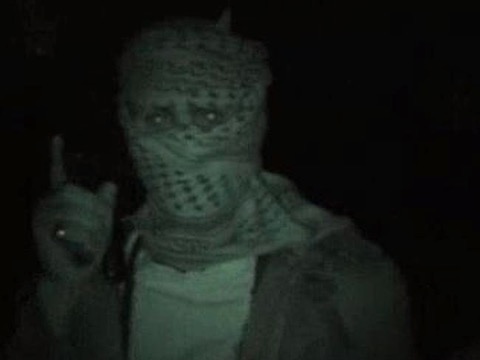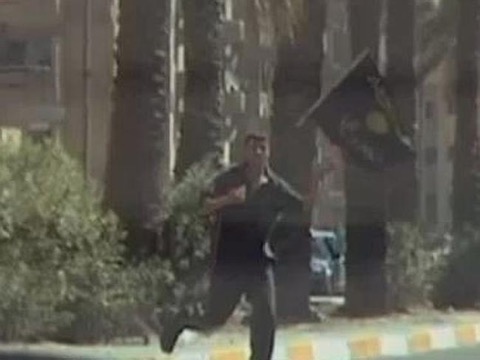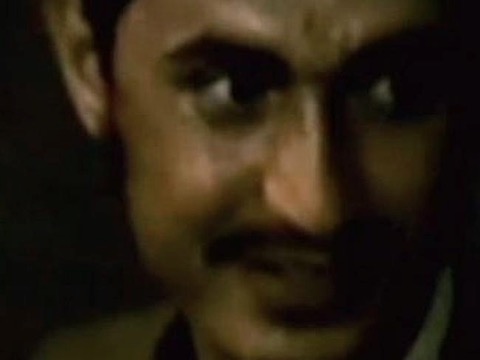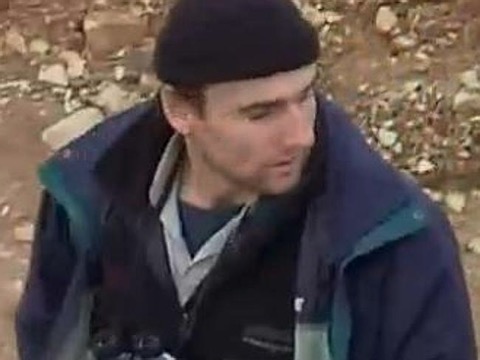Australian: Michael Ware opens up about his experiences in Iraq in documentary Only The Dead

Michael Ware being interviewed on Lateline. Source: Supplied
AS AN ambitious young journalist Michael Ware “couldn’t be happier” to be in Iraq covering the US occupation but after surviving a beheading attempt and witnessing true moments of horror, he began to feel complicit in the violence around him.
The Australian journalist is the only war correspondent to survive being kidnapped by al-Qaeda in Iraq, and became obsessed with its founder Abu Musab al-Zarqawi. He has opened up about his experiences in the film Only The Dead, which is showing at the Sydney Film Festival.
Ware was working for Time magazine when in August, 2003 he captured footage of the car bombing of the Jordanian embassy, the first time a suicide bombing had ever occurred in Baghdad.
He now believes it was the first-ever attack by what the world now knows as the Islamic State.
“None of us knew what it was. Not the foreigners, not the press corps, not the military, not the Iraqis themselves. So as we see this enormous black plume rising above the houses behind us and drive towards it, none of us could’ve ever imagined what we were going to find,” Ware told Lateline.
US forces had invaded Iraq after the overthrow of Saddam Hussein but the tide seemed to turn against the occupation when suicide bombings began rocking the city. Ware wanted to find out who the sinister force was behind the sudden attacks.
Ware gradually gained the trust of the insurgents and fighters allowed him to film them on his small, beat-up Handycam and began taking him to secret meetings at night.
“It was frightening. I’d surrendered myself to these guerillas, men the Americans were hunting and I had found, not knowing if they were friends or if they were going to kill me. I guess I knew it was insane, but I couldn’t help myself,” Ware said.

Footage of Iraqi insurgents filmed by Michael Ware in his documentary Only the Dead.
Despite being ridiculed as amateurs and criminals Ware said he saw an organisation that were “clearly sophisticated, with well-defined command and control structure, and nationalised”.
They also began filming beheadings on camera, a tactic that has become one of the signatures of Islamic State. Al-Zarqawi, the man who became known as the founder of al-Qaeda in Iraq, pioneered beheadings on camera and he is believed to have personally performed the beheading of the first recorded victim, American hostage Nicholas Berg. His practices are now believed to have influenced the formation of Islamic State.
When al-Zarqawi wanted to declare his arrival on the global stage he released a video through Ware. Other insurgents also gave him videos filmed during their actions. This was before the rise of YouTube, Twitter and Facebook.
Ware’s connections also helped him to survive being kidnapped by al-Qaeda in Iraq. At the time Ware was driving through an area in Baghdad that had been claimed by al-Zarqawi’s forces, well within mortar and rocket range of the US embassy.
“One of the first great acts that he (al-Zarqawi) did was he captured a central part of Baghdad.
“This is right under the American’s noses and there’s nothing anyone could do about it.”
Ware wanted to film evidence of the takeover. He was in a car with an insurgent guide and a trusted driver filming the black flags lining a boulevard when they were spotted.
One of al-Zarqawi’s men stepped out from the kerb and pulled a pin on a grenade as he approached the car. When the car stopped Ware was dragged out.
“They were going to behead me. This was at the height of the period where Zarqawi’s men were targeting Westerners, taking them and beheading them. I was a target of opportunity,” Ware told Lateline.
“It wasn’t too long before I was dragged behind one of the apartment blocks and there was a hastily slung black banner like we were seeing in all the execution videos. And there lined up were the men who were going to cut my head off; indeed, a man with a knife. And in fact, they were going to film it with my own camera.
“But it was at this moment, where there’s two of them arguing about how to work my camera, that my insurgent escort finally piped up and stepped in and said that they could not kill me. He said that there will be a turf war between our two groups if you kill this man because he’s our guest, and it was only through gritted teeth that Zarqawi’s men literally pushed me back and I became the only Westerner who ever survives Zarqawi’s organisation.”

An Iraqi insurgent approaches Ware’s car after pulling the pin from a grenade.
Al-Zarqawi eventually became the head of al-Qaeda in Iraq, despite the organisation initially not allowing him to join.
“Abu Musab al-Zarqawi in effect single-handedly hijacked the war in Iraq and turned it to his own design to fulfil his own vision of holy war,” Ware said.
He explained that in the beginning it was former Iraqi soldiers, officers and generals fighting against American occupation. Then al-Zarqawi showed up and took over the conflict “devastating attack by devastating attack”.
“In doing so, he brought about a revolution in holy war. He did what Osama bin Laden would never have dared to have done nor wanted to have done,” Ware said.
“In fact, when he started, he was not al-Qaeda. Al-Qaeda would not allow him to join and he did not want to join al-Qaeda. It was only after a period of time that the two forces, I argue reluctantly, had to come together.”
While the Iraqi Prime Minister has made comments this week that Islamic State did not start in Iraq, but in Syria, Ware said this was “absolutely wrong”.
“We of the West removed the regime of Saddam Hussein, we presented a new platform for global jihad, right there in the Middle East. And the man who stepped into that breach was the founder of the Islamic State, a man called Abu Musab al-Zarqawi.”

Dangerous obsession: Abu Musab al-Zarqawi hijacked the Iraq insurgency and turned it into a holy war.
Al-Zarqawi was eventually killed in 2006 during an air strike north of Baghdad but his ideas live on in Islamic State. At the time of his death he was as wanted a man as Osama bin Laden with the Americans placing a $25 million bounty on his head.
After he was almost beheaded, Ware embedded with the American soldiers as they fought al-Qaeda for control of key towns in Iraq including Ramadi, which is now being fought over again by Islamic State. Ware believes it will be difficult to retake the city.
“I think a lot of people forget that Ramadi was the first-ever capital of the Islamic State,” Ware said.
He said that the only way to regain control of Ramadi was for the local population and the Sunni tribes to rise up again as they did in 2006 and 2007 but this was almost certainly not going to happen. “It’s not a battle that can be won,” he said.
“It took years of work for the US military to develop the trust and the rapport, because these tribes were the insurgency.
“Now the problem is: those tribes are not the tribes they used to be. They’re not as powerful as they were back then, they’re not as organised as they were back then and they’re more vulnerable ‘cause the Americans are not there to offer them assistance, particularly against their own government.”
Ware said that sending in Iranian-backed Shia tropes would only throw fuel on the fire.
“It’s been the actions of successive Iraqi governments, but particularly since the US left that country, that has herded the Sunni population back towards the Islamic State,” he said.
“They certainly don’t want to be living under a regime or in the kind of society that the Islamic State creates, but they feel that they’re better protected that way from their own government.”
After seven years reporting from the region Ware said his outlook had changed since first arriving in the country as a war correspondent for Time magazine.
“I was in my 30s and still young and dumb enough for war to have its false sense of adventure. I simply couldn’t have been happier,” he says in his documentary of his arrival in Iraq.
But after witnessing so much violence, in particular one incident that he filmed, he has needed to find a way to come to terms with the “dark chambers” of his own heart.
“A soldier once wrote that there’s certain dark chambers of the heart that once opened can never be closed again. And when you’re living that human experience in war, which is stretched to its extreme, you start to find these places within your own self,” Ware told Lateline.

Footage of Michael Ware in his documentary Only the Dead.
“There was an incident that I witnessed, in fact an incident that I filmed, and by my silence, I became complicit in what happened around me. All I had to do was clear my throat, all I had to do was say something and the situation would’ve changed. But I made a decision in that moment to keep filming and not to do anything.”
While as a journalist his job was to observe and record, he said that someone’s suffering does not change just because you have your journalist’s hat on.
“Any soldier who’s been to war, any civilian who’s had to live it, will tell you that there are certain things that you just have to come to terms with to move forward.
“In so many ways, the experience of going to war is humbling. It brings you a whole new perspective to life. I will never see the world the same way again, and in so many ways, that’s a privilege. That from now on, every day is a gift, for me and for so many of my friends. And I wouldn’t trade that. But it takes work to get there, as any soldier will tell you. Often, the homecoming is harder than the war itself.”
